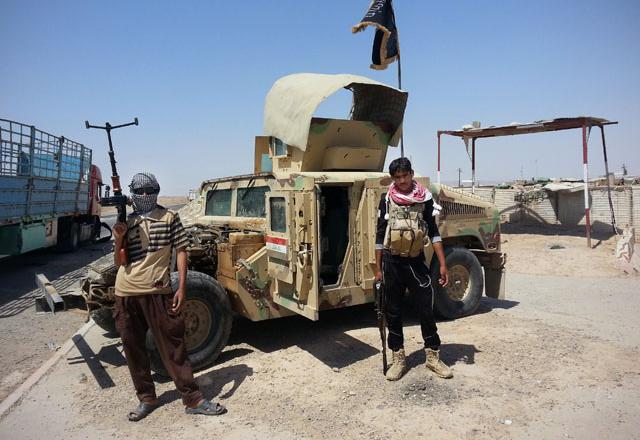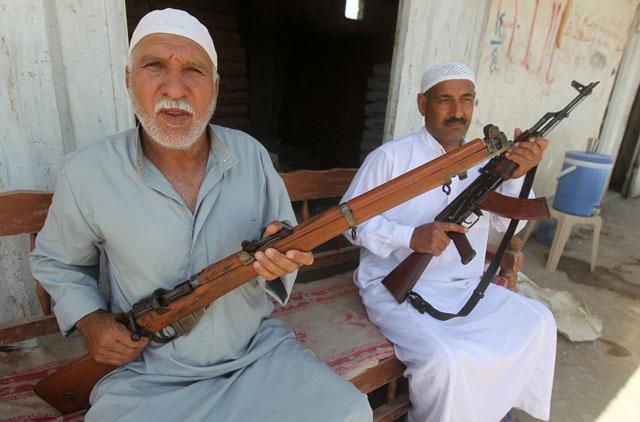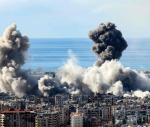You are here
With eye on Iran, Saudi Arabia insists Iraq solution is internal
By Reuters - Jun 19,2014 - Last updated at Jun 19,2014

DOHA/DUBAI — Saudi Arabia kept up a drumbeat of opposition to any foreign intervention in Iraq on Thursday in an apparent message to regional rival Iran, which has hinted at possible cooperation with the United States in quelling insurgents menacing Baghdad.
Washington is considering an Iraqi request to launch air strikes on the positions of Islamic State of Iraq and the Levant (ISIL) rebels, and the Iranian president has said his countrymen will not hesitate to defend Shiite shrines there if need be.
Either scenario would probably dismay Sunni Muslim Gulf Arab governments wary about what they see as meddling by Shiite Muslim power Iran in the region and opposed to any armed action that could harm Sunni communities in Iraq.
In a statement, the Saudi embassy in Britain reiterated that Riyadh opposed “all foreign intervention and interference in the internal affairs of Iraq. Instead, we urge all the people of Iraq, whatever their religious denominations, to unite to overcome the current threats and challenges facing the country”.
And a Saudi source in the Gulf told Reuters that Riyadh’s opposition to foreign intervention was shared by the United States, France and Britain. “No outside interference will be of any benefit,” the source told Reuters.
The comments suggested Iraq risks becoming a pawn in a fierce regional power struggle between Iran and Sunni heavyweight Saudi Arabia, which was aghast when the US occupation after Saddam Hussein’s fall in 2003 brought about elections that empowered Iraq’s Shiite majority.
In a sign of a new chill in already frosty ties between the Sunni Muslim kingdom and Iraq’s Shiite-led government, Saudi Foreign Minister Prince Saud Al Faisal dismissed as “ludicrous” Iraqi charges that the kingdom supported Sunni militants there.
His comments reflected the critical tone of much commentary about Iraqi authorities in the Sunni majority Gulf Arab states, where commentators allege Baghdad has discriminated against Iraq’s minority Sunnis and so has only itself to blame for the onslaught by Sunni militants.
The Iraqi government has repeatedly accused its Gulf neighbours of backing insurgents such as ISIL in Iraq’s turbulent West, charges they deny.
In remarks apparently addressed to Iraqi Prime Minister Nouri Al Maliki, Prince Saudi suggested in remarks to reporters Riyadh would not take lessons from Baghdad in countering militancy.
He said Iraq should follow the kingdom’s example in countering Islamist armed groups, a reference to Riyadh’s successful 2003/06 campaign against Al Qaeda.
‘Conspiracy’ against sunnis
“[Our] advice to the Iraqi official to combat terrorism in his country is to follow the policy which the Kingdom is following and not to accuse it of being with terrorism...praise be to God we have cleaned our country of this epidemic.”
Maliki, an ally of Iran, has appealed for national unity with Sunni critics of his government after a rapid offensive through the north of the country by ISIL, which wants to carve out a
mediaeval style caliphate in the heart of the Middle East.
To date, that effort at inclusion has not born fruit.
In a statement likely to be received with unease in Riyadh, US Secretary of State John Kerry said on Thursday the United States is contemplating communicating with Iran to share information about the insurgency spreading across Iraq, but is not seeking to work together with Iran to address the crisis.
Retired Qatari diplomat Nasser Al Khalifa, in comments that appear to reflect a wide strand of thinking among Gulf Arab policymakers, said in a Twitter message that it would be “wise” for the West to stay clear of Iraq, unless it were for the purpose of removing Maliki from power.
“Any intervention in Iraq by the west to prop up criminal Maliki in Iraq will be seen by the whole Sunni Arabs and Muslims as war against them,” said Khalifa, a former embassador to Washington.
“For the West or Iran or the two working together to fight beside Maliki against Sunni Arabs will be seen as another conspiracy against Sunnis,” he said.
The United Arab Emirates announced on Wednesday it was recalling its ambassador to Baghdad for consultations, saying it was worried that the Iraqi government’s “sectarian” policies could heighten political tensions and worsen security there.
Islamist scholars led by influential Qatar-based cleric Youssef Al Qaradawi urged Arab and Islamic states on Thursday to protect Sunnis in Iraq, who they said had suffered a great injustice at the hands of the Iraqi government.
Related Articles
Iraq has asked the United States for air support in countering Sunni rebels, the top US general said on Wednesday, after the militants seized major cities in a lightning advance that has routed the Shiite-led government’s army.
The capture of Iraqi cities Mosul and Tikrit by Al Qaeda-influenced jihadis has not only redrawn the map of a country corroded by sectarian hatred.
Iraqi government forces backed by helicopter gunships began an offensive on Saturday to retake the northern city of Tikrit from Sunni Islamist militants while party leaders pursued talks that could end Prime Minister Nouri Al Maliki’s divisive rule.

















